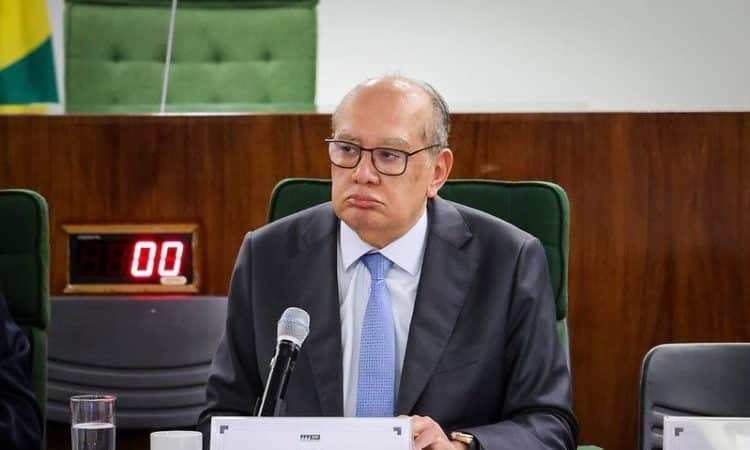Gilmar says he is waiting for the indigenous people to return and that the time frame commission will not stop

Minister Gilmar Mendes, of the Federal Supreme Court (STF), said this Monday (9) that he expects the return of participation of representatives of indigenous peoples in the commission created at the Court to negotiate the time frame for indigenous lands.
According to the judge, the commission’s work will continue “with whoever is at the table, regardless of whether or not they represent the interests of indigenous or non-indigenous people”.
Gilmar also said that, in an “attitude of consideration for those absent”, this Monday’s meeting would only deal with “legal debates”.
“For now, in an attitude of consideration for those absent, I make it clear that this afternoon there will only be legal debates until the representatives appointed by Apib (Articulation of Indigenous Peoples of Brazil) return to the dialogue or, in case their lack of interest in meeting at this democratic and participatory space, until the five indigenous representatives whose appointment by Apib was in deference to the request of the association itself are replaced”, declared the minister.
The speech was made at the opening of the third conciliation hearing at the STF regarding the time frame.
At the last meeting, on August 28, indigenous representatives were chosen by the Articulation of Indigenous Peoples of Brazil (Apib).
According to the entity, there were no guarantees of sufficient protection for indigenous people and of a possible agreement that would protect the autonomy of original peoples.
One of the main points raised by Apib, which was not addressed, concerned the suspension of the law that created the time frame. The continuation of the rule in force during the commission’s work is seen by indigenous representatives as a situation of negotiating inequality.
For Gilmar, the debate in the commission requires a “necessary political willingness and willingness to reopen the negotiation sides”, without bringing “layered certainties”.
“I would like to mention, in particular, that we are awaiting the return of representatives of indigenous communities to this negotiating table,” he stated.
The table that receives the commission’s work kept the six chairs reserved for indigenous people empty.
According to the minister, none of the members of the commission “has the power to stop negotiations and work”.
“They will proceed with whoever is at the table, regardless of whether or not they represent the interests of indigenous or non-indigenous people,” said Gilmar. “Anyone who wants to be heard and have their point of view taken into consideration must be present and follow the procedures of the condition of this self-composition”.
A CNN questioned Apib about minister Gilmar Mendes’ statements, and awaits a position from the entity.
Apib exit
Apib left the commission at the last meeting, on August 28. One of the points that led to this decision was the maintenance of the time frame law.
“Apib requested the suspension of the law with the aim of guaranteeing minimally equal conditions for the participation of indigenous peoples in the Conciliation Commission, as the validity of the law has led to an increase in violence in the territories, as widely reported in the records”, said the entity, at the last meeting.
Furthermore, Apib asked that voluntariness and autonomy of will be recognized in conciliation processes so that the position of indigenous peoples is respected in the construction of any agreement on their rights.
With the departure of the indigenous people, the debate between political parties, representatives of Congress, government and entities. The work is expected to last until December.
What is discussed?
The target of the discussion is the law approved by the Legislature that creates the time frame and, in practice, restricts the possibility of demarcating territories of original peoples.
The time frame thesis establishes that indigenous people only have the right to lands that they were occupying or disputing on October 5, 1988, the date of promulgation of the Federal Constitution.
The rule was approved on the same day that the Supreme Court established the thesis declaring the time frame thesis unconstitutional on September 27, 2023.
President Luiz Inácio Lula da Silva (PT) vetoed the project, but they were overturned by the Legislature in December. The law has been in force since then.
the rules for compensation to owners established by the STF when overturning the time frame thesis.
Why does the topic return to discussion?
Even though the STF had already decided that the thesis was unconstitutional, the issue returned to the Court because parties and entities presented four actions regarding the new law.
PP, PL and Republicans sued the STF asking ministers to confirm the constitutionality of the rule.
In turn, the PDT, the PT-PCdoB-PV federation and the Association of Indigenous Peoples of Brazil (Apib) filed actions seeking to overturn sections of the law – among them, the one that created the time frame.
There is also a fifth action, in which the PP asks the STF to recognize Congress’s failure to regulate a provision of the Constitution that opens up space for the exploitation of the “natural riches of the soil, rivers and lakes” on indigenous lands as long as there is “ relevant public interest of the Union”.

